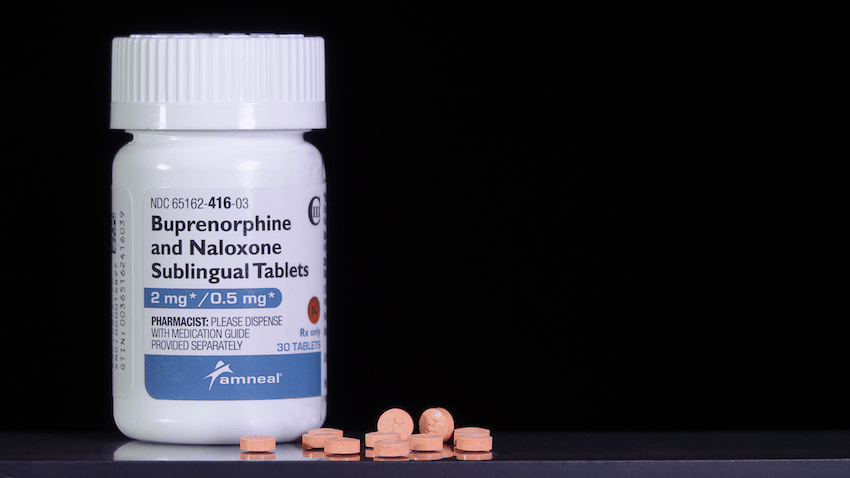Prefer to contact us online instead?
Use this form to send us a message. One of our recovery specialists will respond promptly.
Medication-assisted treatment eases pain and fear of recovery
Opioids are among some of the most abused drugs in the United States. Another common problem the country faces is alcohol abuse. What do these two issues have in common? Both are commonly treated with medication-assisted treatment. Studies have found there are many benefits to choosing MAT for substance abuse over traditional rehab services alone.
An estimated 10.1 million people aged 12 or older misused opioids in the past year. 9.7 million people misused prescription pain relievers and 745,000 people used heroin. – 2019 National Survey on Drug Use and Health
What do these two issues have in common? Both are commonly treated with medication-assisted treatment or MAT services. Rehab centers across the country including Lifetime Recovery have started taking advantage of MAT as an effective way of caring for people with certain addictions. With that said, what does MAT involve, and is it effective? Studies have found that there are many benefits of choosing MAT over traditional rehab services alone.
At Lifetime Recovery we specialize in helping people with mental illness and substance use disorders, including opioids such as heroin, by using medication-assisted treatment to minimize the sometimes painful and difficult withdrawal symptoms from drugs and alcohol.
 What is medication-assisted treatment?
What is medication-assisted treatment?
Medication-assisted treatment combines therapy with the use of specific FDA-approved, anti-craving medications to help reduce withdrawal symptoms and cravings for drugs or alcohol. Despite the usual controversy with medical procedures, MAT services have proven to be effective in helping people with opioid use disorder (OUD) combat their addictive cravings and maintain sobriety.
Opioid dependence and addiction are not the same thing, but even someone who has become dependent on these powerful drugs may experience lasting effects that require professional help to avoid long-term or irreversible damage. The recovery process from opioid dependence is characterized by powerful cravings to use and a high risk of relapse, especially in the early stages of addiction recovery.
Applying medication-assisted treatment helps find the root issue and makes it easier to treat the entirety of a condition, including any underlying problems that may be exacerbating it.
While some treatment programs tend only to a person’s individual symptoms (unsuccessfully, never getting to the root of the issue), using MAT combined high-quality, evidence-based psychological care has been most successful as a “whole-patient” approach to healing.
The benefits of medication-assisted treatment for substance abuse
Medication-assisted treatment is an approach that focuses on your specific needs, not just your symptoms. Addiction and mental illness can often present with similar signs and symptoms, which can make it hard for medical professionals to get an accurate diagnosis. With MAT to minimize symptoms along with therapy and support services, our addiction and recovery specialists can better diagnose and treat you for long-term success.
Most importantly, MAT is an excellent option if you have tried rehab in the past but didn’t stay sober. In these situations, MAT provides just the right amount of assistance to give you a better chance at success the next time you attempt sobriety.
Here are key benefits of medication-assisted treatment for substance abuse:
- Suppresses withdrawal symptoms
- Reverses cravings
- Neutralizes or reduces the usage of opiates and other substances
- Promotes sobriety
- Increases the recognition of therapy
- Treats symptoms of a co-occurring disorder
MAT can also help ease the transition back into regular life at home after completing treatment.
By using MAT and therapy together, we are also able to educate users of prescription painkillers on ways to better control addiction triggers. We do this through evidence-based cognitive and behavioral therapeutic techniques, which as a result, have been shown to lengthen the duration of recovery and sobriety.
How effective is medication-assisted treatment for substance abuse?
Addiction and recovery specialists believe that medication-assisted treatment is a highly effective tool for people who need to overcome addiction. It typically has a higher success rate than standard rehab programs.
Why?
Most rehab experts believe that MAT has a higher success rate because of the additional assistance MAT provides during and after detox. Many of the medications are designed to reduce cravings. Thanks to fewer cravings, people are less likely to relapse while they learn to manage addiction.
The prescriptions that people take during MAT recovery depend on the drugs to which they’ve developed addictions. In general, the purpose of the medications is to normalize bodily functions. Along with relieving physical cravings, these prescriptions relieve psychological cravings.
Because of the high success rate of MAT, it’s an effective option for just about anyone who struggles with drug or alcohol addiction. It’s ideal for people who have completed treatment once and are released as well as for people who have never received treatment before.
Medication-assisted treatment for alcohol addiction
Since it’s so easy for people to get their hands on alcohol, most people think that alcohol addiction isn’t so serious. The truth, however, is that alcohol is not only addictive but also creates some of the worst withdrawal symptoms. In severe cases, alcohol withdrawal can be deadly. That’s why it’s so important for those with severe alcohol addiction to seek medication-assisted treatment for alcohol detox. Below are some of the medications approved for this type of program.
Types of medications used for alcohol detox and recovery:
- Acamprosate
- Disulfiram
- Naltrexone
- Buprenorphine
- Methadone
At our alcohol and drug rehab center, we use a variety of medications for drug and alcohol detox. The reason is that different prescriptions ease cravings for various types of narcotics. As a result, the medications that you receive will depend heavily on your specific drug addiction. This use of different medications is what makes MAT so effective.
Acamprosate
Acamprosate is a unique drug that helps you avoid drinking after you quit. It stabilizes the chemical imbalance in the brain that occurs from alcohol abuse. However, acamprosate doesn’t prevent withdrawal symptoms. For this reason, alcohol rehab centers tend to use it after people have achieved abstinence for several days.
Acamprosate is available in a tablet that you can take three times a day. To achieve optimal results and create a routine, you should take the tablets at the same time every day. While acamprosate is effective, it can cause some side effects, such as difficulty sleeping, diarrhea, and an upset stomach.
Disulfiram
Disulfiram is a prescription that you typically get if you suffer from chronic alcoholism. Once again, it works best if you’ve completed detox before you start taking it. Unlike acamprosate, disulfiram doesn’t alter the chemical balance in the brain. Instead, it discourages you from drinking by changing how your body eliminates alcohol. As a result, drinking alcohol makes you feel sick, which discourages you from drinking.
Generally, you can take this medication orally once a day. The unpleasant side effects of drinking alcohol can start within 10 minutes of consuming a small amount. These side effects can include vomiting, headache, and nausea.
Naltrexone
Naltrexone is one of the few medications on this list that can be used for both alcohol and opioid addiction. This drug works by blocking the euphoric effects that you feel from drinking alcohol. Because of that, it helps you remain motivated and avoid relapse. Also, the drug can reduce alcohol cravings.
In general, naltrexone treatment lasts for about three to four months. It’s available in pill form, but you can take it as an injection, too. Naltrexone works best, of course, when you continue undergoing addiction therapy and counseling.
 Medication-assisted treatment for opioid addiction
Medication-assisted treatment for opioid addiction
Buprenorphine and methadone are common medications used to help treat opioid addiction. Opioid addiction is hard for people to overcome, partially because of how strong the cravings are for this drug during detox and withdrawal. Thankfully, MAT can help those suffering from opioid use disorders. Naltrexone can be used for alcohol use and opioid use disorders.
Buprenorphine
Buprenorphine helps reduce and suppress cravings for opioid drugs, such as heroin. It works by producing a euphoric effect. However, this effect is much weaker than what people experience with heroin or other medications used during MAT, such as methadone.
When you take buprenorphine as your health care team prescribes, it’s both safe and effective. The oral pill can diminish physical dependence on opioids. At the same time, the slightly euphoric effect can limit withdrawal symptoms.
Methadone
Much like buprenorphine, methadone reduces cravings for opioids. It can also block the effects that opioids have on the body if you use opioids while in an MAT program. This medication is available in pill, liquid, and powder forms.
All of these prescriptions are effective in helping people overcome drug addictions. However, they can’t do all of the work alone. It’s essential to only use them in combination with therapy and counseling to assist in achieving and sustaining sobriety.
The therapy side of medication-assisted treatment
The medications you take during MAT are just one piece of the puzzle. During the program, you must undergo therapy and counseling sessions as well. The goal of therapy is to develop and strengthen coping skills that help you avoid relapse once you get out of treatment. Addiction therapy sessions involve identifying and addressing the root cause of addiction in your life.
Cognitive-behavioral therapy is an important part of MAT.
The idea behind it is to change negative thoughts, which experts believe can cause negative behaviors. In this case, a negative way of thinking can lead you to the negative behavior of abusing drugs.
Dual-diagnosis treatment is another crucial element of an MAT program. Most of the time, people don’t just wake up one day and choose to take the path of addiction. Typically, an underlying cause or another mental disorder pushes them down this path.
Simply treating the addiction without addressing underlying issues can result in relapse after treatment. The reason is that the core issue that led to the addiction remains and continues to wreak havoc on their well-being.
Is medication-assisted treatment is right for you?
Before deciding if medication-assisted treatment (MAT) is right for you, you must first understand how this type of program works to treat your specific needs. Medication-assisted treatment for substance abuse combines therapy and medication management for co-occurring disorders.
MAT is a proven method by the Food and Drug Administration (FDA) and other organizations to help people overcome—more than just successfully treating—drug addiction. Most importantly, medication-assisted treatment helps sustain recovery more efficiently.
It’s important to note that not all treatment methods will work the same way for each person. Different medications and counseling approaches are chosen for each individual based on a variety of factors.
Medication-assisted treatment for substance abuse in New Jersey
Trying to detox and go through recovery alone is dangerous and lonely. Supervised detox allows you to start your journey more comfortably and safely. One key component of staying in recovery is having a supportive team of people helping you through every step. Our facility is a safe and peaceful place where you can come to share your struggles and find the support you deserve.
At Lifetime Recovery in Mullica Hill, NJ, in South Jersey, our outpatient and medical treatment center treats people with conditions ranging from drug and alcohol addiction to mental illness.
We’re also one of the few alcohol and drug rehab centers to provide gambling addiction treatment. Through our integrated model and holistic approaches, we provide evidence-based winning solutions for you to recover from painkiller addiction and develop healthy ways to live the rest of your life.
Serving all of New Jersey, Philadelphia, Delaware, Connecticut, and New York.

 What is medication-assisted treatment?
What is medication-assisted treatment?


